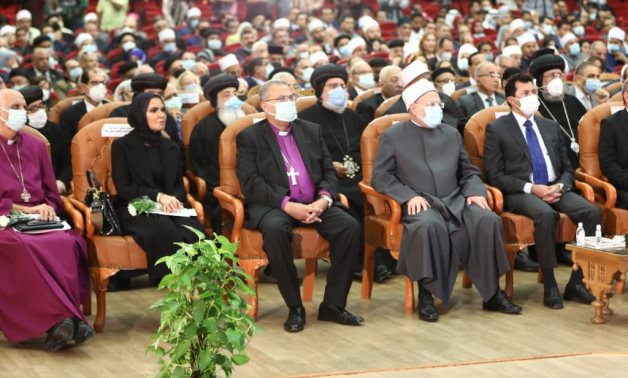
Top members of the Muslim and Christian communities in Egypt at the ceremony marking the 10th anniversary of the Egyptian Family House - Press photo
CAIRO – 11 November 2021: It is impossible for all humans to agree on just one religion, that is why freedom of religion is “one of the most precious human rights,” Al-Azhar Sheikh Ahmed al-Tayeb said at the tenth anniversary of the Egyptian Family House initiative.
Al-Azhar Imam said during the ceremony in November that the Egyptian Family House was the fruit of a deep and thoughtful understanding between Al-Azhar and the Church to fortify Egypt against strife. Religious division have destroyed not only some neighboring countries and societies, but also civilizations rooted in ancient times, claiming the lives of thousands, leaving behind thousands of maimed victims, widows, orphans, and people displaced from their homeland, Sheikh al-Tayeb continued.
The Egyptian Family House is an initiative that represents a model of religious coexistence. Established in 2011 by the post-revolutionary cabinet of Essam Sharaf, the Egyptian Family House was first conceived by Sheikh al-Tayeb and late Pope Shenouda II. In the aftermath of the 2011 revolution, religious leaders in the country figured that there were attempts to instigate sectarian strife in Egypt, so they decided to establish the Egyptian Family House to spread several concepts and human rights.
Headquartered in Cairo, the Egyptian Family House consists of Muslim scholars, clerics from the Coptic Church, representatives of various Christian faiths in Egypt, and a number of Egyptian intellectuals.
The initiative aims to preserve the fabric of Muslim-Christian unity within the Egyptian society by establishing a new discourse that caters to the needs of the youth, encourages peace, shun hatred and violence, promotes cooperation and coexistence among Muslims and Christians, and training imams and priests together to acquaint the grassroots of both religions.
Generally, the Family House works on promoting the Muslim and Christian values of compassion, empathy and understanding and upholding the principles of coexistence and tolerance.
The Grand Imam added that Al-Azhar and the Egyptian churches established the Family House after sensing the duty of religious institutions to participate in the national, security and political efforts made by the state to defeat a “scheme” to instill division. Other major and small Arab countries fell for this scheme and spiraled into armed conflicts until this day.
<iframe width="560" height="315" src="https://www.youtube.com/embed/2zE1BfRpsBs" title="YouTube video player" frameborder="0" allow="accelerometer; autoplay; clipboard-write; encrypted-media; gyroscope; picture-in-picture" allowfullscreen></iframe>
Sheikh al-Tayeb also noted that the fraternity of Islam and Christianity to preserve the right of the Egyptian citizen to live in security, peace and stability, is one thing, but to merge the two religions is another, Sheikh al-Tayeb said, referring to the so-called “Abrahamic religion” that some new outlets have claimed is emerging to make one religion of Judaism, Christianity, and Islam.
For his part, Pope Tawadros II of Alexandria and Patriarch of St. Mark emphasized during the ceremony the importance of unity of the Egyptian people. Religions should be a reason for unity and cooperation, not fighting and disputes, the Pope said.
Pope Tawadros also said that Egypt is one of the richest civilizations in the whole world; therefore, Egyptians have always been living amidst mixed cultures and religions all along their history.
He said that the Egyptian Family House has been working on spreading community peace, achieve justice and reaffirm the concept of citizenship.
<iframe width="560" height="315" src="https://www.youtube.com/embed/9W70rJ1t_kc" title="YouTube video player" frameborder="0" allow="accelerometer; autoplay; clipboard-write; encrypted-media; gyroscope; picture-in-picture" allowfullscreen></iframe>
In his speech, he said that humanity has been through a lot especially during the past period due to the effects of COVID-19 and isolations, along with ither natural challenges such earthquakes, volcanoes and climate change.
Pope Tawadros called on adopting an approach that is based on five basic concepts to live life during the coming ten years. These concepts are “the love of God, the love of nature, the love of the other human beings, the love of our country, and the love of eternity, in which we long to be,” according to the Pope.
Minister of Justice Omar Marwan said at the ceremony that the Family House also confronts terrorism and extremist ideology.
He added that president Abdel Fattah al-Sisi sponsors the initiative because the unity of the Egyptian people is the only guarantee to keep the country safe.
Minister of Immigration Nabila Makram also participated in the ceremony, saying that her ministry organizes forums for Egyptians abroad of the second and third generations in which they meet with Sheikh al-Tayeb and Pope Tawadros. In these forums, they learn how Egyptians at home coexist peacefully.
She set the example of Pope Tawadros participating in the inauguration of al-Fattah al-Alim Mosque in the Administrative Capital, while Sheikh al-Tayeb inaugurated the Cathedral of the Nativity of Christ in the same new city.
“It is a clear message for the Family House in which we live. We have, also, never seen a President of the Republic visiting the Cathedral in the celebration of Christmas, as the President did," Makram said, referring to the historic visit of Sisi to the Cathedral during Christmas Mass as the first Egyptian president ever to do so.
The Egyptian church in Kenya hosted the Egyptians there as the coronavirus pandemic broke out for 3 weeks during Ramadan, and the church offered the suhoor and iftar meals and allowed for a spiritual environment during the holy month until they were brought back to Egypt.
In her speech, the Minister went on to say that the national project Haya Karima is a vivid example of caring for all Egyptian citizens and improving the quality of life for them. Haya Karima gathers all ministries and institutions for that purpose, including the Ministry of Immigration and the Episcopal Services of the Orthodox Church, and the work does not discriminate in any way, but rather selects the neediest villages to give better infrastructure and services.
Comments
Leave a Comment